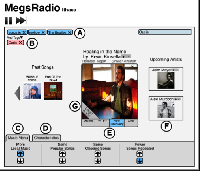Bryn Hughes (Music) and Doug Turnbull (Computer Science) to present at Music: Cognition, Technology, Society at Cornell University this weekend
05/08/12
Contributed by Arlene Dende
 Bryn Hughes and Doug Turnbull will both be presenting work at the 2012 Conference on Music: Cognition, Technology, Society hosted by Cornell University this coming weekend (May 11-13, 2012). Registration for the conference is free and more details can be found at: http://www.mcts2012.com/
Bryn Hughes and Doug Turnbull will both be presenting work at the 2012 Conference on Music: Cognition, Technology, Society hosted by Cornell University this coming weekend (May 11-13, 2012). Registration for the conference is free and more details can be found at: http://www.mcts2012.com/
Friday, May 11
9-11:15am: Patterns, schemata and systems
Bryn Hughes (Ithaca College) – Does Rock Play by Its Own Rules? An Empirical Investigation of Harmonic Expectation in Rock Music
Sunday May, 13
9-11:15am: Music Information Retrieval
Douglas Turnbull (Ithaca College) – Exploring Control and Feedback Mechanisms for Personalized Internet Radio
Bryn Hughes (Ithaca College) – Does Rock Play by Its Own Rules? An Empirical Investigation of Harmonic Expectation in Rock Music
Does harmony convey different functions in rock and common-practice music, or does it behave in a universally consistent way? Some music theorists suggest that harmony in rock music is perceived in terms of common-practice syntax (Everett 1999 and 2004). Conversely, others propose that the language of rock abides by its own set of rules (Moore 1992 and 1995; Stephenson 2002). This research aims to empirically investigate this question.
The results of this study support the claim that harmonic expectations of rock and common-practice music are similar. This claim is further solidified by significant correlations with several empirical studies (Krumhansl 1990; Bigand et al 1996) and theoretical metrics for judging chord relatedness (Lerdahl 2001). Finally, this paper shows how the subtle differences revealed between stylistic contexts align with the speculative claims made by those advocating for unique harmonic function in rock, and discusses ways in which these discrepancies might be further investigated in future empirical work.
Douglas Turnbull (Ithaca College) – Exploring Control and Feedback Mechanisms for Personalized Internet Radio
Personalized Internet radio players like Pandora and Last.fm provide users with customized streams of music. While they are extremely popular, these systems are limited in the number of the ways that a user can control the radio station. They tend to provide the user with only a small amount of feedback after the user alters the station. We introduce a system called MegsRadio that provides a user with a broad variety of control and feedback mechanisms. Based on a small user study, we find that users make use of many of the novel control mechanism and develop a better understanding of the playlist algorithm based on the feedback they receive from the system. * This is joint work with two Ithaca College undergraduate student researchers, Richard Roberts '12 and Kris Stensland '14.
0 Comments
https://www.ithaca.edu/intercom/article.php/20120508133105465
 Bryn Hughes and Doug Turnbull will both be presenting work at the 2012 Conference on Music: Cognition, Technology, Society hosted by Cornell University this coming weekend (May 11-13, 2012). Registration for the conference is free and more details can be found at: http://www.mcts2012.com/
Bryn Hughes and Doug Turnbull will both be presenting work at the 2012 Conference on Music: Cognition, Technology, Society hosted by Cornell University this coming weekend (May 11-13, 2012). Registration for the conference is free and more details can be found at: http://www.mcts2012.com/